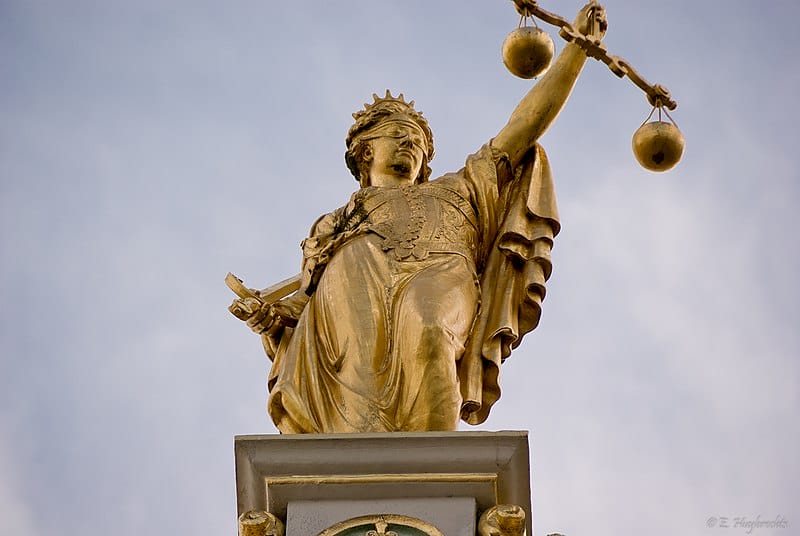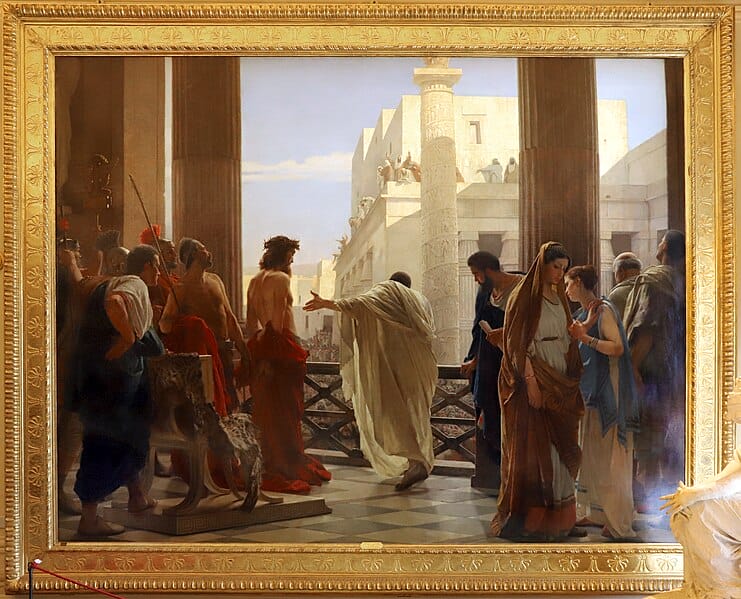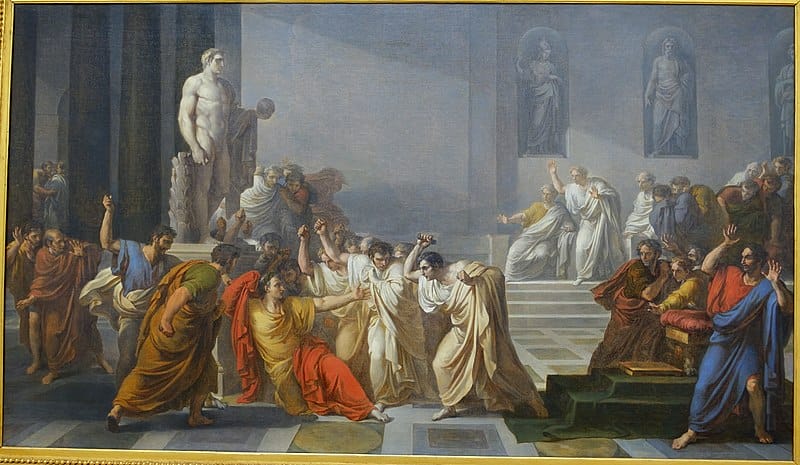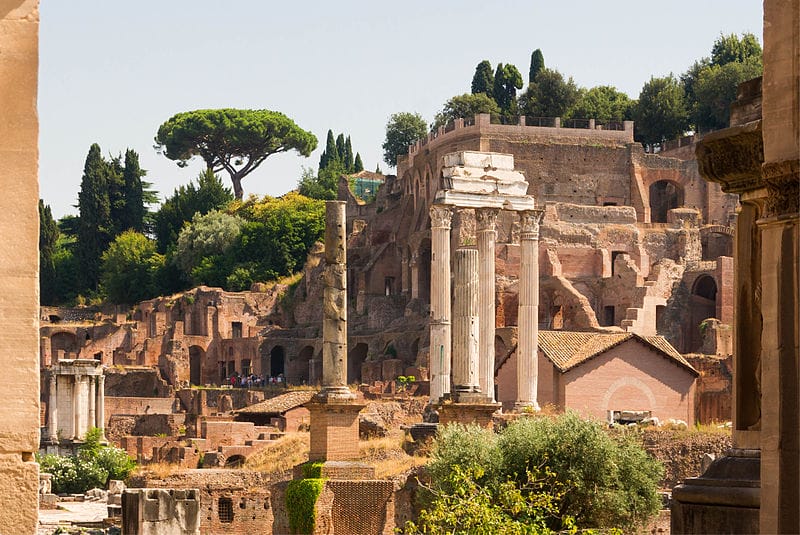The complexity and sophistication of the legal framework were mirrored in the numerous Roman lawsuits and legal cases that arose. These cases often involved intricate issues of property, citizenship, and contractual obligations, reflecting the societal norms and values of their time. Throughout the extensive history of Rome, from its early days as a republic to the gloriousness of the empire, the legal system played an integral role in structuring society and governance. Roman law has left a huge mark on the foundations of the Western legal tradition.

Source: Emmanuel Huybrechts from Laval, Canada, CC BY 2.0 https://creativecommons.org/licenses/by/2.0, via Wikimedia Commons
Some of the most intriguing Roman lawsuits and legal cases provide valuable insight into the dynamics of ancient jurisprudence. These legal battles were not just about the private disputes of citizens but also about the interpretation and evolution of the law itself. The outcomes of such cases could set precedents that would influence Roman legal practice for generations. They showcase the robustness of the Roman legal apparatus, which had mechanisms in place to handle various forms of litigation, whether it involved private individuals, the state, or the intricate play of politics and justice.
Key Takeaways
- Roman law underpinned societal structure during both the Republic and Empire, reflecting its significance in history.
- Intriguing Roman lawsuits and legal cases reveal the complexity of ancient Roman jurisprudence and its far-reaching influence.
- The Roman legal system provided a foundation for Western law through precedent-setting cases and jurisprudential evolution.
Notable Roman Lawsuits
The Roman legal system was complex, and its cases reflect the intricacies of society, addressing a wide spectrum of issues from property and contracts to criminal acts. And these are our Top 10 Lawsuits and Laws in the Roman Empire. Choose your favorite and write in the comments.
1. Roman Lawsuits: Lex Aquilia (3rd century BCE)
The Lex Aquilia was one of the earliest laws addressing wrongful damage to property. It provided a system for calculating restitution, where the defendant had to pay based on the property’s highest value in the previous year.
2. Roman Lawsuits: The Trial of Gaius Verres (70 BC)
Gaius Verres, a former Roman governor, stood trial for extortion and corruption. Famed orator Cicero was the prosecutor, and the case highlighted abuses of power in the provinces. Verres was ultimately exiled due to the overwhelming evidence against him. This trial proved that even governors could be trialed if they commit crimes.
3. Roman Lawsuits: The Trial of Milo (52 BC)
Titus Annius Milo was tried for the murder of Publius Clodius Pulcher. The political rivalry reached its peak in this trial, with Cicero again providing a notable defense, although Milo was convicted and exiled.
4. Roman Lawsuits: The Trial of Jesus of Nazareth (1st century AD)

Source: Sailko, CC BY 3.0 https://creativecommons.org/licenses/by/3.0, via Wikimedia Commons
This Roman lawsuit underscores Roman interaction with local jurisdictions and religious groups. Jesus of Nazareth was accused by Jewish authorities of various offenses, and Pontius Pilate, the Roman prefect, authorized his crucifixion. This moment changed the course of history of the world and created the most practiced religion in Europe.
5. Roman Lawsuits: The Bacchanalian Conspiracy (186 BC)
A secret cult engaging in alleged illicit activities resulted in the Bacchanalian Trials. The Roman Senate’s intervention led to mass arrests and executions, underscoring Rome’s control over private religions and cults.
6. Roman Lawsuits: The Lex Julia de Adulteriis Coercendis (18 BC)
Augustus introduced this law to enforce morality, particularly targeting adultery. It allowed fathers and husbands to take legal actions against the offenders, reflecting societal changes towards family and morality.
7. Roman Lawsuits: The Case of the Gabinian Law (67 BC)
The Gabinian Law granted Pompey extraordinary powers to cleanse the Mediterranean Sea of pirates. It’s notable for introducing special commands, illustrating the balance between public safety and regular legal procedures. This law also influenced the shift of power towards notable generals, which ultimately led to the establishment of the Empire.
8. Roman Lawsuits: The Testament of Caesar (44 BC)

The aftermath of Caesar’s assassination led to legal disputes over his will and the transfer of his title and property. The testament’s legal standing influenced the formative years of the Roman Empire.
9. Roman Lawsuits: The Lex Julia de Maritandis Ordinibus (18 BC)
Another law by Augustus, this one aimed at increasing the birth rate among the upper classes by encouraging marriage and procreation. It penalized those who remained celibate and those who were childless.
10. Roman Lawsuits: The Trial of Sextus Roscius (80 BC)
Cicero’s defense of Sextus Roscius was significant for highlighting the misuse of proscriptions and the perilous state of property rights during Sulla’s dictatorship. Roscius was acquitted, which was a remarkable outcome given the political climate.
People Also Ask:

What principle did the ‘Law of the Twelve Tables’ embody in the Roman legal system?
The ‘Law of the Twelve Tables‘ served as the foundation for Roman law, emphasizing the principle of equality under the law. It outlined the rights of citizens and legal procedures, ensuring transparency and codification of norms that applied to all strata of society.
How did ancient Roman lawsuits and trials typically proceed?
Ancient Roman lawsuits and trials were often public, with the accuser and accused presenting their case before a magistrate or a jury. Trial procedures were typically oral, with emphasis on gathering evidence and witnessing testimony. Magistrates played crucial roles in framing the issues and overseeing the legal process.
What were some typical punishments for crimes in ancient Rome?
Punishments in ancient Rome ranged from fines and public service to physical penalties, exile, and even death. The severity of the punishment depended on the nature of the crime, the social status of the convicted, and the discretion of the judiciary.
The structure of Roman homes, particularly in urban settings, often mirrored the social status of the occupants. Wealthy citizens lived in spacious, well-appointed domus with private courtyards, while the lower classes, including many non-citizens, resided in cramped, multi-storied insulae with limited amenities.
In what ways did Roman bureaucracy influence the Pax Romana?
Roman bureaucracy was instrumental in establishing and maintaining the Pax Romana, providing a stable structure for governance across vast territories. Efficient administration, including law enforcement, taxation, and public services, fostered a period of relative peace and prosperity in the empire.
Can you describe a landmark legal case from the Roman Empire?
A landmark legal case from the Roman Empire that stands out is that of Gaius Verres, a governor put on trial for extortion and corruption in Sicily. The prosecution by Cicero, an eminent lawyer and orator, not only led to Verres’ exile but also showcased the potential for the legal system to hold even the powerful accountable.
Hello, my name is Vladimir, and I am a part of the Roman-empire writing team.
I am a historian, and history is an integral part of my life.
To be honest, while I was in school, I didn’t like history so how did I end up studying it? Well, for that, I have to thank history-based strategy PC games. Thank you so much, Europa Universalis IV, and thank you, Medieval Total War.
Since games made me fall in love with history, I completed bachelor studies at Filozofski Fakultet Niš, a part of the University of Niš. My bachelor’s thesis was about Julis Caesar. Soon, I completed my master’s studies at the same university.
For years now, I have been working as a teacher in a local elementary school, but my passion for writing isn’t fulfilled, so I decided to pursue that ambition online. There were a few gigs, but most of them were not history-related.
Then I stumbled upon roman-empire.com, and now I am a part of something bigger. No, I am not a part of the ancient Roman Empire but of a creative writing team where I have the freedom to write about whatever I want. Yes, even about Star Wars. Stay tuned for that.
Anyway, I am better at writing about Rome than writing about me. But if you would like to contact me for any reason, you can do it at [email protected]. Except for negative reviews, of course. 😀
Kind regards,
Vladimir
